人教版八年级上册 Unit 1 Where did you go on vacation? Section A 2a-Grammar Focus 课件 (共38张PPT)
文档属性
| 名称 | 人教版八年级上册 Unit 1 Where did you go on vacation? Section A 2a-Grammar Focus 课件 (共38张PPT) | 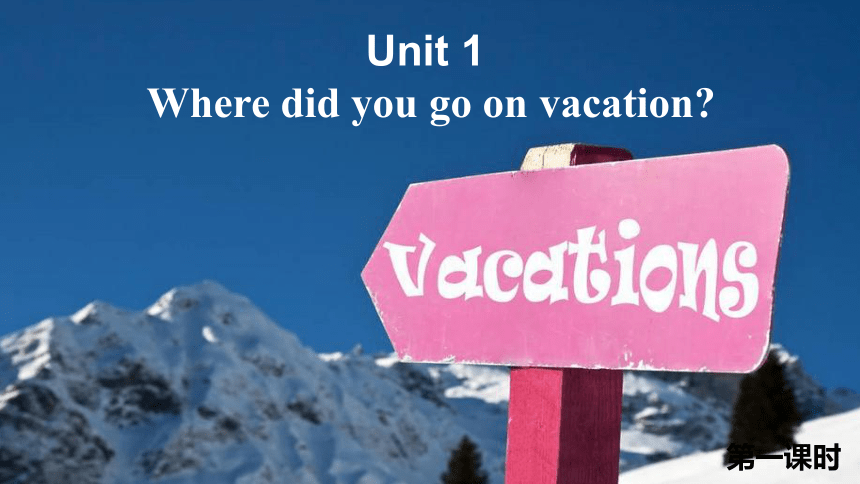 | |
| 格式 | zip | ||
| 文件大小 | 6.5MB | ||
| 资源类型 | 教案 | ||
| 版本资源 | 人教新目标(Go for it)版 | ||
| 科目 | 英语 | ||
| 更新时间 | 2022-08-22 09:40:59 | ||
图片预览

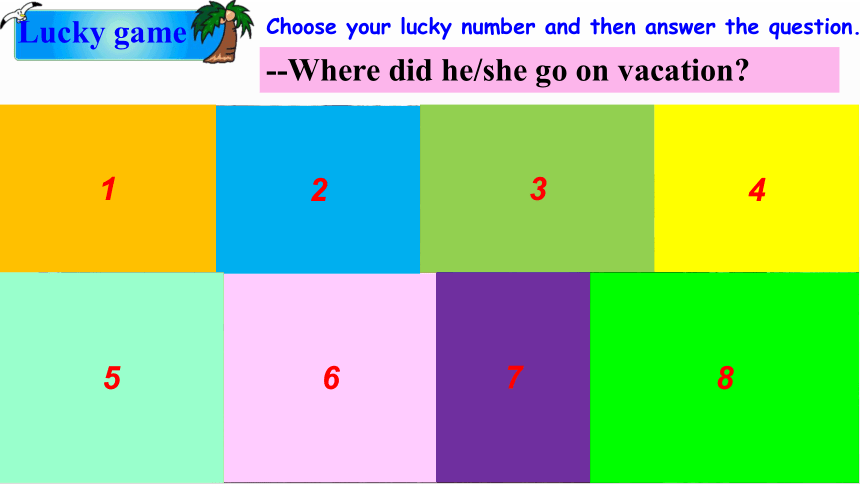

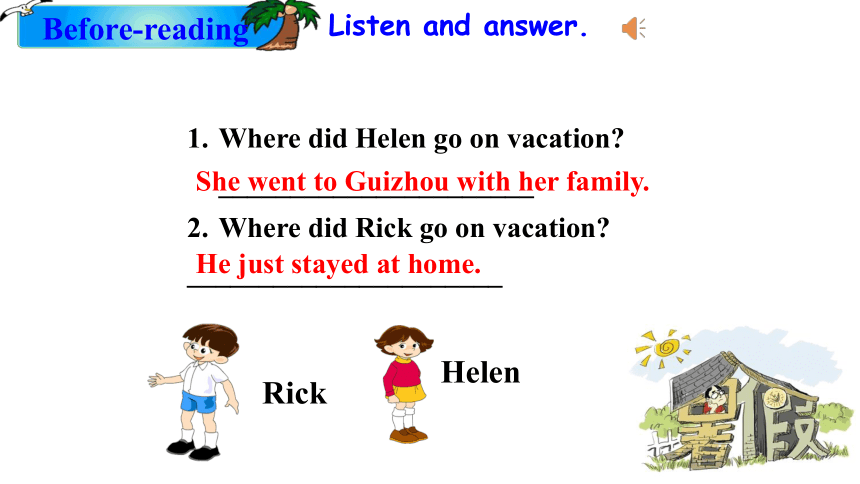
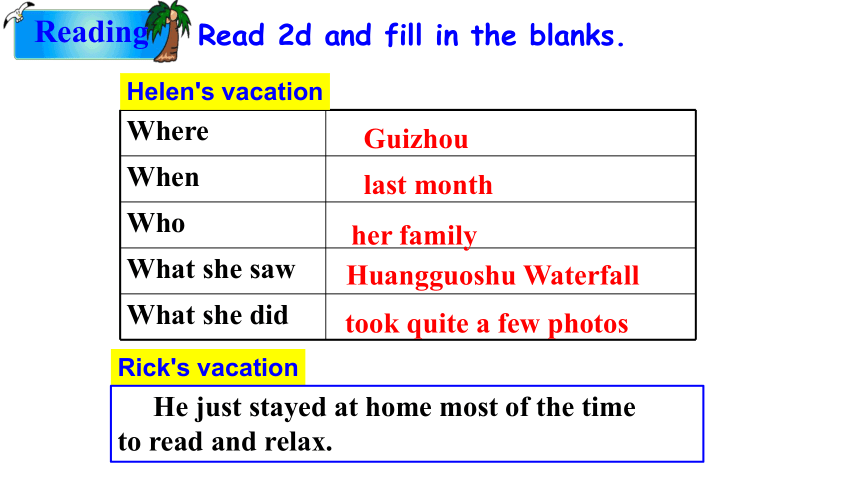
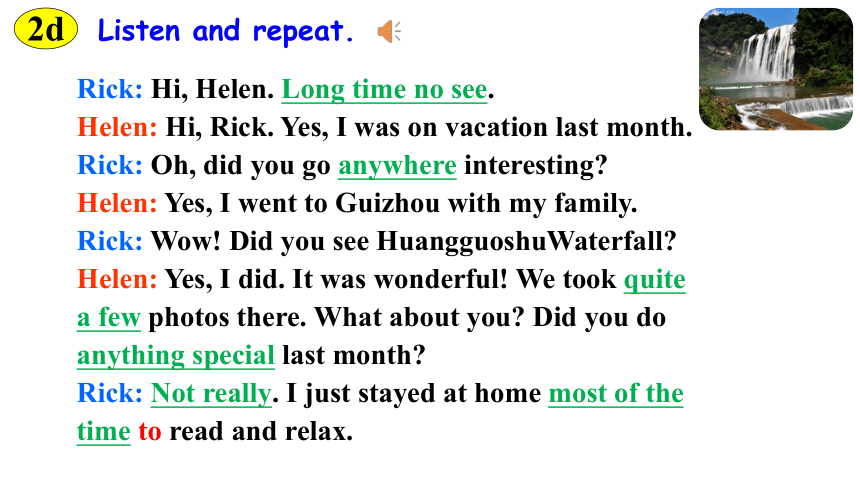
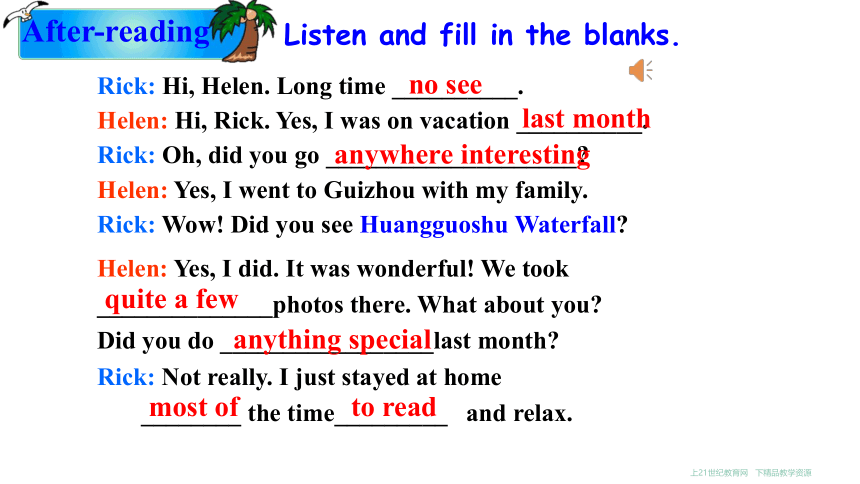
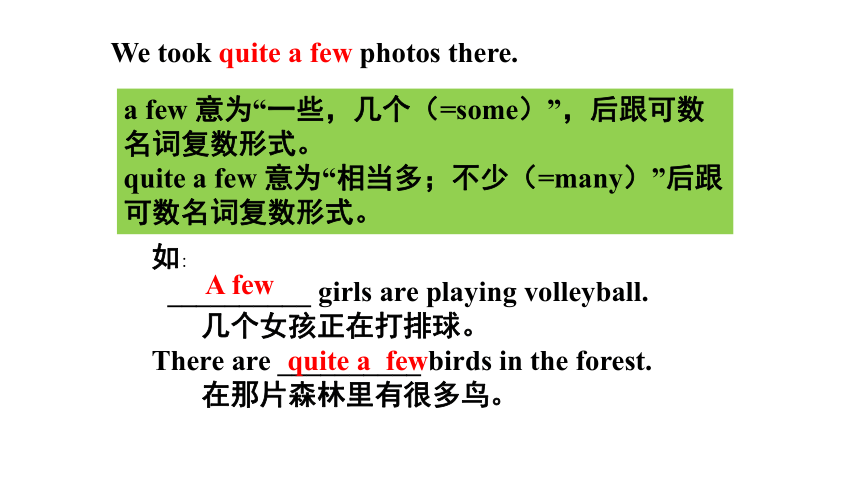
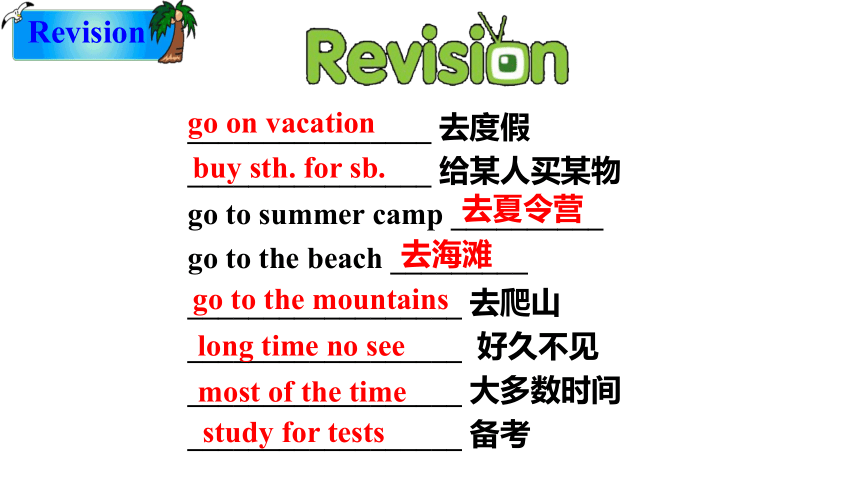
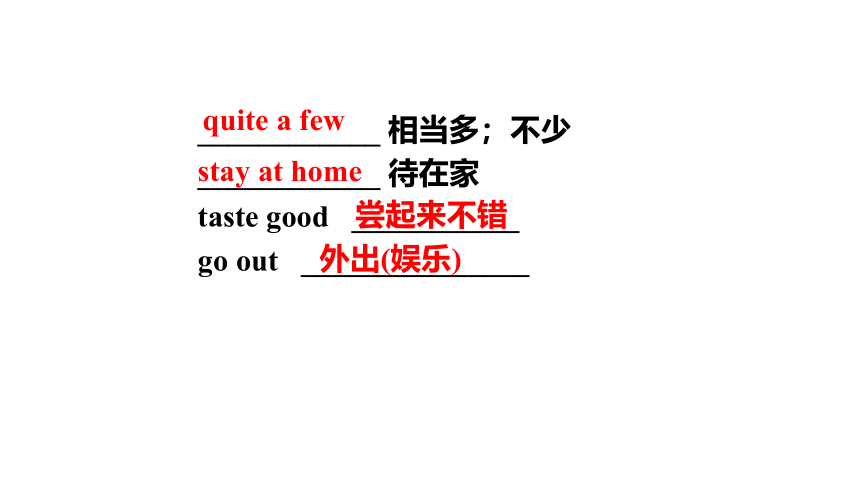

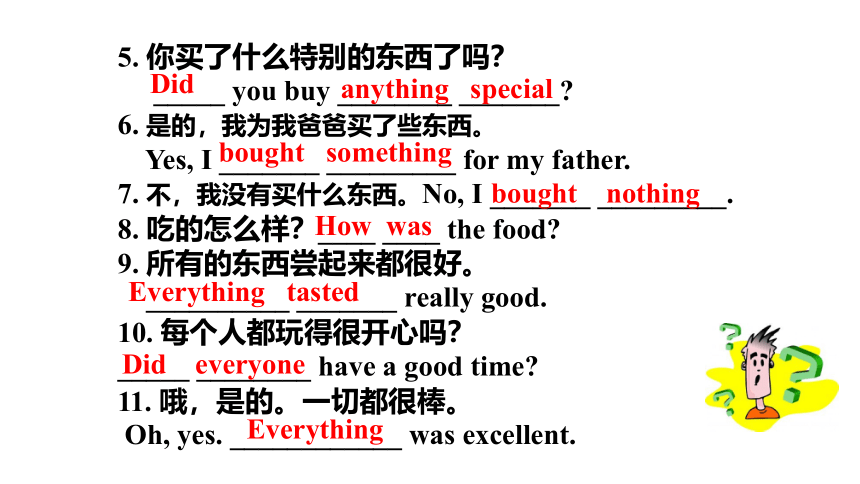
文档简介
(共38张PPT)
Unit 1
Where did you go on vacation
第一课时
6
2
1
Lucky game
Choose your lucky number and then answer the question.
3
4
5
7
8
--Where did he/she go on vacation
Did you see Huangguoshu Waterfall
Huangguoshu Waterfall is an interesting and wonderful place in Guizhou.You can see quite a few waterfalls in China,but Huangguoshu Waterfall is very special.Because it's the biggest waterfall in China.People often take quite a few photos here.
Before-reading
Listen and answer.
Where did Helen go on vacation ______________________
Where did Rick go on vacation
______________________
She went to Guizhou with her family.
He just stayed at home.
Rick
Helen
Reading
Where
When
Who
What she saw
What she did
Helen's vacation
Rick's vacation
He just stayed at home most of the time
to read and relax.
Guizhou
last month
her family
Huangguoshu Waterfall
took quite a few photos
Read 2d and fill in the blanks.
Listen and repeat.
2d
Rick: Hi, Helen. Long time no see.
Helen: Hi, Rick. Yes, I was on vacation last month.
Rick: Oh, did you go anywhere interesting
Helen: Yes, I went to Guizhou with my family.
Rick: Wow! Did you see HuangguoshuWaterfall
Helen: Yes, I did. It was wonderful! We took quite a few photos there. What about you Did you do anything special last month
Rick: Not really. I just stayed at home most of the time to read and relax.
Listen and fill in the blanks.
After-reading
Rick: Hi, Helen. Long time __________.
Helen: Hi, Rick. Yes, I was on vacation __________.
Rick: Oh, did you go ____________________
Helen: Yes, I went to Guizhou with my family.
Rick: Wow! Did you see Huangguoshu Waterfall
no see
last month
anywhere interesting
Helen: Yes, I did. It was wonderful! We took
______________photos there. What about you
Did you do _________________last month
Rick: Not really. I just stayed at home
________ the time_________ and relax.
quite a few
anything special
most of
to read
We took quite a few photos there.
a few 意为“一些,几个(=some)”,后跟可数名词复数形式。
quite a few 意为“相当多;不少(=many)”后跟可数名词复数形式。
如:
__________ girls are playing volleyball.
几个女孩正在打排球。
There are __________ birds in the forest.
在那片森林里有很多鸟。
A few
quite a few
________________ 去度假
________________ 给某人买某物
go to summer camp __________
go to the beach _________
__________________ 去爬山
__________________ 好久不见
__________________ 大多数时间
__________________ 备考
go on vacation
buy sth. for sb.
去夏令营
去海滩
go to the mountains
long time no see
most of the time
study for tests
Revision
____________ 相当多;不少
____________ 待在家
taste good ___________
go out _______________
quite a few
stay at home
尝起来不错
外出(娱乐)
Practice
1. 你去了什么地方去度假?
______ _____ you go on ________
2. 我去了纽约市。
I _____ ____ New York City.
3. 你和别的什么人一起去的吗?
______ ______ go out with _______
4. 不,没有别人在这儿。每个人都在度假。
No. ____ _____ was here.
________ was on ________.
Complete the sentences.
vacation
Where did
went to
Did you
anyone
No one
Everyone
vacation
5. 你买了什么特别的东西了吗?
_____ you buy ________ _______
6. 是的,我为我爸爸买了些东西。
Yes, I _______ _________ for my father.
7. 不,我没有买什么东西。No, I _______ _________.
8. 吃的怎么样?____ ____ the food
9. 所有的东西尝起来都很好。
__________ _______ really good.
10. 每个人都玩得很开心吗?
_____ ________ have a good time
11. 哦,是的。一切都很棒。
Oh, yes. ____________ was excellent.
anything special
Did
bought something
bought nothing
How was
Everything tasted
Did everyone
Everything
Where did you go on vacation I went to New York City.
Did you go out with anyone No. No one was here. Everyone was on vacation.
Did you buy anything special Yes, I bought something for my father.
No, I bought nothing.
How was the food Everything tasted really good!
Did everyone have a good time Oh, yes. Everything was excellent.
Grammar Focus
复合不定代词
语法专讲
定义:some, any, every, no 可以与 body, thing, one 构成复合不定代词,表示人或物:
every any some no
thing
body
one
everything
一切
everybody
每人
everyone
每人
anything
任何事物
anybody
任何人
anyone
任何人
something
某物,某事
nothing
没有东西
somebody
某人
someone
某人
no one
没有人
nobody
没有人
1.由some, any, no, every构成的复合不定代词作主语时,都作单数看待,其谓语动词用三单形式。
Something is wrong with my watch.
Nobody knows what does he look like.
复合不定代词用法
Everyone ____(be) on vacation.
is
No one ________(want) this comeputer game.
wants
2.带some的复合不定代词常用于肯定句中;带any的复合不定代词常用于否定句或一般疑问句中。
Somebody is playing football now.
Did anyone call me today
She wants someone to help her. (改为否定句)
____________________________________
She doesn’t want anyone to help her.
I went to the supermarket to buy something.
(改为一般疑问句)
___________________________________________
Did you go to the supermarket to buy anything
但some-可以用在表示请求,建议的疑问句里,表示肯定的意思。
Would you like something to eat
Why don’t you ask somebody to help you
What about do something
Can you help me with something
在一般疑问句中,当问话人希望得到对方的肯定回答时,用要some-类的复合不定代词;
当问话人只是提出问题,而对回答的期待没有倾向性时,则用any-类的复合不定代词。
Do you have something to tell me
有事要告诉我吧?
Do you have anything to tell me
有什么事要告诉我吗?
句a表示说话人期望有事告诉他,而句b无此含义。
3.当使用形容词修饰不定代词时,形容词要放在不定代词的______。
There is something wrong with the computer.
Did you do anything special on vacation
I have something interesting to tell you.
4.注意:除no one以外,其他复合不定代词都写成一个词。
后面
e.g. 这本书里有什么新东西吗?
Is there _________ _____ in this
book
今天没有什么特别的事。
There’s _________ _______ today.
anything new
nothing special
中考链接
1.—What do you need, sir?(2017,济宁)
—________. I didn't want to eat anything. Thanks.
A.Nothing B.Anything
C.Something D.Everything
2. 【2017年黑龙江齐齐哈尔】
—Would you like ____to eat
—Yes, please.
A. anything delicious B. delicious anything
C. something delicious
3a
Fill in the blanks with the words in the box and practice the conversation.
Linda: Did you do _________ fun on your
vacation, Alice
Alice: Yes, I did. I went to Sanya.
Linda: How did you like it
Alice: Well, it was my first time there, so
__________ was really interesting.
Linda: Did you go with ________
anyone something
anything everything nothing
anything
everything
anyone
Alice: Yes, I did. I went with my sister.
Linda: Did you go shopping
Alice: Of course! I bought _________
for my parents, but ______ for myself.
Linda: Why didn’t you buy ________ for
yourself
Alice: I didn’t really see _________ I like.
something
anything
nothing
anything
myself (我自己) ,yourself (你自己)是反身代词。表示“某人自己的词”叫反身代词。
3b
Fill in the blanks in the e-mail message with the
words in the box.
Dear Bill,
How was your vacation Did you do _________ interesting Did __________ in the family go with you I went to a friend’s farm in the countryside with my family.__________ was great. We fed some hens and saw some baby pigs. They were so cute! The only problem was that there was __________ much to do in the evening but read. Still ___________ seemed to be bored. Bye for now.
Mark
anything
everyone
everything
nothing
No one
anything everything
nothing everyone no one
v. 好像;似乎;看来
adj. 厌倦的;烦闷的
feed hens 喂母鸡
in the countryside
在乡下
第一人称
第二人称
yourself
myself
反身代词:
enjoy oneself 玩的开心
I enjoyed ___________(me) yesterday.
You usually enjoy____________(you) with your brother.
by oneself 通过...自己
I study English by____________(I).
You go home by____________(you) every day.
myself
yourself
myself
yourself
一般过去时
构成
用法
动词的过去式
1. 表示过去某个时间发
生的动作或存在的状态。
2. 表示过去经常或
反复发生的动作。
yesterday
last night / week
in 1990 / just now
On Sunday morning
two days ago
一般过去时
常用时间状语
Sentences
I did my homework yesterday.
I played soccer last Sunday.
I cleaned my room last week.
I went to the beach three years ago.
I played tennis with my friends last weekend.
I went to the movies three days ago.
动词过去式
的构成
规则动词
regular verbs
不规则动词
irregular verbs
1. 动词be的变化:
was
were
am
is
are
2. 助动词do的变化:
do→ did (在过去时里助动词do没有人称和数的变化)
如:Did you play soccer yesterday
Did he play soccer yesterday
b)动词变化规则
规则变化
直接加ed:work—— worked
look——looked
play——played
2. 以e结尾的单词,直接加d:
live ——lived
hope——hoped
use——used
3 以辅音字母+y结尾的,变y为i加ed:study—— studied
carry——carried
worry——worried
4 以元音字母+y结尾的,直接加ed:enjoy ——enjoyed
play——played
5 以重读闭音节结尾的,双写最后的辅音字母+ed:stop—— stopped
plan——planned
am, is—was are—were
go—went do—did
have—had come—came
take—took say—said
eat—ate see—saw
get—got put—put
sleep—slept give—gave
write—wrote read—read
动词不规则变化
/red/
buy—bought sit—sat run—ran
swim —swam make—made
feel—felt hear—heard
grow—grew tell—told
know—knew find—found
begin—began bring —brought
stand—stood spend—spent
catch—caught teach—taught
动词不规则变化
句子构成:系动词be的过去时.
am (is) →was are →were
陈述句:He was at home yesterday.
否定句:He wasn’t at home yesterday.
疑问句:Was he at home yesterday
Yes, he was./ No, he wasn’t.
行为动词的一般过去时:
陈述句:主语+动词过去式+其它
I go to the movie. →
否定句:主语+助动词didn’t+动词原形+其它
I don’t go to school today. →
一般疑问句:Did +主语+动词原形+其它
Do you have breakfast →
I went to the movie.
I didn’t go to school.
Did you have breakfast
Yes, I do./ No, I don’t.
Yes, I did./No, I didn’t.
Past 过去
Now 现在
go to the movies
do my homework
play tennis
play soccer
clean the room
went to the movies
did my homework
played tennis
played soccer
cleaned the room
1. --- How __________ your vacation
--- It was pretty good.
A. was B. were C. did
2. --- Where __________ they go yesterday
--- They went to the Summer Palace.
A. are B. do C. did
3. --- Where did you go on vacation
--- I __________ my grandma.
A. visit B. visited C. visits
Choose the right answers.
4. --- Did she __________ to the movies
--- No. She went to the party.
A. goes B. go C. went
5. Betty stayed at home and ________ for
the test last weekend.
A. study B. studies C. studied
6. --- __________ your mother go fishing
--- No, she didn’t. She went shopping.
A. Does B. Is C. Did
go shopping 购物
keep a diary 记日记
in the countryside 在乡下
feed hens 喂母鸡
Thank you!
Unit 1
Where did you go on vacation
第一课时
6
2
1
Lucky game
Choose your lucky number and then answer the question.
3
4
5
7
8
--Where did he/she go on vacation
Did you see Huangguoshu Waterfall
Huangguoshu Waterfall is an interesting and wonderful place in Guizhou.You can see quite a few waterfalls in China,but Huangguoshu Waterfall is very special.Because it's the biggest waterfall in China.People often take quite a few photos here.
Before-reading
Listen and answer.
Where did Helen go on vacation ______________________
Where did Rick go on vacation
______________________
She went to Guizhou with her family.
He just stayed at home.
Rick
Helen
Reading
Where
When
Who
What she saw
What she did
Helen's vacation
Rick's vacation
He just stayed at home most of the time
to read and relax.
Guizhou
last month
her family
Huangguoshu Waterfall
took quite a few photos
Read 2d and fill in the blanks.
Listen and repeat.
2d
Rick: Hi, Helen. Long time no see.
Helen: Hi, Rick. Yes, I was on vacation last month.
Rick: Oh, did you go anywhere interesting
Helen: Yes, I went to Guizhou with my family.
Rick: Wow! Did you see HuangguoshuWaterfall
Helen: Yes, I did. It was wonderful! We took quite a few photos there. What about you Did you do anything special last month
Rick: Not really. I just stayed at home most of the time to read and relax.
Listen and fill in the blanks.
After-reading
Rick: Hi, Helen. Long time __________.
Helen: Hi, Rick. Yes, I was on vacation __________.
Rick: Oh, did you go ____________________
Helen: Yes, I went to Guizhou with my family.
Rick: Wow! Did you see Huangguoshu Waterfall
no see
last month
anywhere interesting
Helen: Yes, I did. It was wonderful! We took
______________photos there. What about you
Did you do _________________last month
Rick: Not really. I just stayed at home
________ the time_________ and relax.
quite a few
anything special
most of
to read
We took quite a few photos there.
a few 意为“一些,几个(=some)”,后跟可数名词复数形式。
quite a few 意为“相当多;不少(=many)”后跟可数名词复数形式。
如:
__________ girls are playing volleyball.
几个女孩正在打排球。
There are __________ birds in the forest.
在那片森林里有很多鸟。
A few
quite a few
________________ 去度假
________________ 给某人买某物
go to summer camp __________
go to the beach _________
__________________ 去爬山
__________________ 好久不见
__________________ 大多数时间
__________________ 备考
go on vacation
buy sth. for sb.
去夏令营
去海滩
go to the mountains
long time no see
most of the time
study for tests
Revision
____________ 相当多;不少
____________ 待在家
taste good ___________
go out _______________
quite a few
stay at home
尝起来不错
外出(娱乐)
Practice
1. 你去了什么地方去度假?
______ _____ you go on ________
2. 我去了纽约市。
I _____ ____ New York City.
3. 你和别的什么人一起去的吗?
______ ______ go out with _______
4. 不,没有别人在这儿。每个人都在度假。
No. ____ _____ was here.
________ was on ________.
Complete the sentences.
vacation
Where did
went to
Did you
anyone
No one
Everyone
vacation
5. 你买了什么特别的东西了吗?
_____ you buy ________ _______
6. 是的,我为我爸爸买了些东西。
Yes, I _______ _________ for my father.
7. 不,我没有买什么东西。No, I _______ _________.
8. 吃的怎么样?____ ____ the food
9. 所有的东西尝起来都很好。
__________ _______ really good.
10. 每个人都玩得很开心吗?
_____ ________ have a good time
11. 哦,是的。一切都很棒。
Oh, yes. ____________ was excellent.
anything special
Did
bought something
bought nothing
How was
Everything tasted
Did everyone
Everything
Where did you go on vacation I went to New York City.
Did you go out with anyone No. No one was here. Everyone was on vacation.
Did you buy anything special Yes, I bought something for my father.
No, I bought nothing.
How was the food Everything tasted really good!
Did everyone have a good time Oh, yes. Everything was excellent.
Grammar Focus
复合不定代词
语法专讲
定义:some, any, every, no 可以与 body, thing, one 构成复合不定代词,表示人或物:
every any some no
thing
body
one
everything
一切
everybody
每人
everyone
每人
anything
任何事物
anybody
任何人
anyone
任何人
something
某物,某事
nothing
没有东西
somebody
某人
someone
某人
no one
没有人
nobody
没有人
1.由some, any, no, every构成的复合不定代词作主语时,都作单数看待,其谓语动词用三单形式。
Something is wrong with my watch.
Nobody knows what does he look like.
复合不定代词用法
Everyone ____(be) on vacation.
is
No one ________(want) this comeputer game.
wants
2.带some的复合不定代词常用于肯定句中;带any的复合不定代词常用于否定句或一般疑问句中。
Somebody is playing football now.
Did anyone call me today
She wants someone to help her. (改为否定句)
____________________________________
She doesn’t want anyone to help her.
I went to the supermarket to buy something.
(改为一般疑问句)
___________________________________________
Did you go to the supermarket to buy anything
但some-可以用在表示请求,建议的疑问句里,表示肯定的意思。
Would you like something to eat
Why don’t you ask somebody to help you
What about do something
Can you help me with something
在一般疑问句中,当问话人希望得到对方的肯定回答时,用要some-类的复合不定代词;
当问话人只是提出问题,而对回答的期待没有倾向性时,则用any-类的复合不定代词。
Do you have something to tell me
有事要告诉我吧?
Do you have anything to tell me
有什么事要告诉我吗?
句a表示说话人期望有事告诉他,而句b无此含义。
3.当使用形容词修饰不定代词时,形容词要放在不定代词的______。
There is something wrong with the computer.
Did you do anything special on vacation
I have something interesting to tell you.
4.注意:除no one以外,其他复合不定代词都写成一个词。
后面
e.g. 这本书里有什么新东西吗?
Is there _________ _____ in this
book
今天没有什么特别的事。
There’s _________ _______ today.
anything new
nothing special
中考链接
1.—What do you need, sir?(2017,济宁)
—________. I didn't want to eat anything. Thanks.
A.Nothing B.Anything
C.Something D.Everything
2. 【2017年黑龙江齐齐哈尔】
—Would you like ____to eat
—Yes, please.
A. anything delicious B. delicious anything
C. something delicious
3a
Fill in the blanks with the words in the box and practice the conversation.
Linda: Did you do _________ fun on your
vacation, Alice
Alice: Yes, I did. I went to Sanya.
Linda: How did you like it
Alice: Well, it was my first time there, so
__________ was really interesting.
Linda: Did you go with ________
anyone something
anything everything nothing
anything
everything
anyone
Alice: Yes, I did. I went with my sister.
Linda: Did you go shopping
Alice: Of course! I bought _________
for my parents, but ______ for myself.
Linda: Why didn’t you buy ________ for
yourself
Alice: I didn’t really see _________ I like.
something
anything
nothing
anything
myself (我自己) ,yourself (你自己)是反身代词。表示“某人自己的词”叫反身代词。
3b
Fill in the blanks in the e-mail message with the
words in the box.
Dear Bill,
How was your vacation Did you do _________ interesting Did __________ in the family go with you I went to a friend’s farm in the countryside with my family.__________ was great. We fed some hens and saw some baby pigs. They were so cute! The only problem was that there was __________ much to do in the evening but read. Still ___________ seemed to be bored. Bye for now.
Mark
anything
everyone
everything
nothing
No one
anything everything
nothing everyone no one
v. 好像;似乎;看来
adj. 厌倦的;烦闷的
feed hens 喂母鸡
in the countryside
在乡下
第一人称
第二人称
yourself
myself
反身代词:
enjoy oneself 玩的开心
I enjoyed ___________(me) yesterday.
You usually enjoy____________(you) with your brother.
by oneself 通过...自己
I study English by____________(I).
You go home by____________(you) every day.
myself
yourself
myself
yourself
一般过去时
构成
用法
动词的过去式
1. 表示过去某个时间发
生的动作或存在的状态。
2. 表示过去经常或
反复发生的动作。
yesterday
last night / week
in 1990 / just now
On Sunday morning
two days ago
一般过去时
常用时间状语
Sentences
I did my homework yesterday.
I played soccer last Sunday.
I cleaned my room last week.
I went to the beach three years ago.
I played tennis with my friends last weekend.
I went to the movies three days ago.
动词过去式
的构成
规则动词
regular verbs
不规则动词
irregular verbs
1. 动词be的变化:
was
were
am
is
are
2. 助动词do的变化:
do→ did (在过去时里助动词do没有人称和数的变化)
如:Did you play soccer yesterday
Did he play soccer yesterday
b)动词变化规则
规则变化
直接加ed:work—— worked
look——looked
play——played
2. 以e结尾的单词,直接加d:
live ——lived
hope——hoped
use——used
3 以辅音字母+y结尾的,变y为i加ed:study—— studied
carry——carried
worry——worried
4 以元音字母+y结尾的,直接加ed:enjoy ——enjoyed
play——played
5 以重读闭音节结尾的,双写最后的辅音字母+ed:stop—— stopped
plan——planned
am, is—was are—were
go—went do—did
have—had come—came
take—took say—said
eat—ate see—saw
get—got put—put
sleep—slept give—gave
write—wrote read—read
动词不规则变化
/red/
buy—bought sit—sat run—ran
swim —swam make—made
feel—felt hear—heard
grow—grew tell—told
know—knew find—found
begin—began bring —brought
stand—stood spend—spent
catch—caught teach—taught
动词不规则变化
句子构成:系动词be的过去时.
am (is) →was are →were
陈述句:He was at home yesterday.
否定句:He wasn’t at home yesterday.
疑问句:Was he at home yesterday
Yes, he was./ No, he wasn’t.
行为动词的一般过去时:
陈述句:主语+动词过去式+其它
I go to the movie. →
否定句:主语+助动词didn’t+动词原形+其它
I don’t go to school today. →
一般疑问句:Did +主语+动词原形+其它
Do you have breakfast →
I went to the movie.
I didn’t go to school.
Did you have breakfast
Yes, I do./ No, I don’t.
Yes, I did./No, I didn’t.
Past 过去
Now 现在
go to the movies
do my homework
play tennis
play soccer
clean the room
went to the movies
did my homework
played tennis
played soccer
cleaned the room
1. --- How __________ your vacation
--- It was pretty good.
A. was B. were C. did
2. --- Where __________ they go yesterday
--- They went to the Summer Palace.
A. are B. do C. did
3. --- Where did you go on vacation
--- I __________ my grandma.
A. visit B. visited C. visits
Choose the right answers.
4. --- Did she __________ to the movies
--- No. She went to the party.
A. goes B. go C. went
5. Betty stayed at home and ________ for
the test last weekend.
A. study B. studies C. studied
6. --- __________ your mother go fishing
--- No, she didn’t. She went shopping.
A. Does B. Is C. Did
go shopping 购物
keep a diary 记日记
in the countryside 在乡下
feed hens 喂母鸡
Thank you!
同课章节目录
- Unit 1 Where did you go on vacation?
- Section A
- Section B
- Unit 2 How often do you exercise?
- Section A
- Section B
- Unit 3 I'm more outgoing than my sister.
- Section A
- Section B
- Unit 4 What's the best movie theater?
- Section A
- Section B
- Unit 5 Do you want to watch a game show?
- Section A
- Section B
- Unit 6 I'm going to study computer science.
- Section A
- Section B
- Unit 7 Will people have robots?
- Section A
- Section B
- Unit 8 How do you make a banana milk shake?
- Section A
- Section B
- Unit 9 Can you come to my party?
- Section A
- Section B
- Unit 10 If you go to the party, you'll have a grea
- Section A
- Section B
